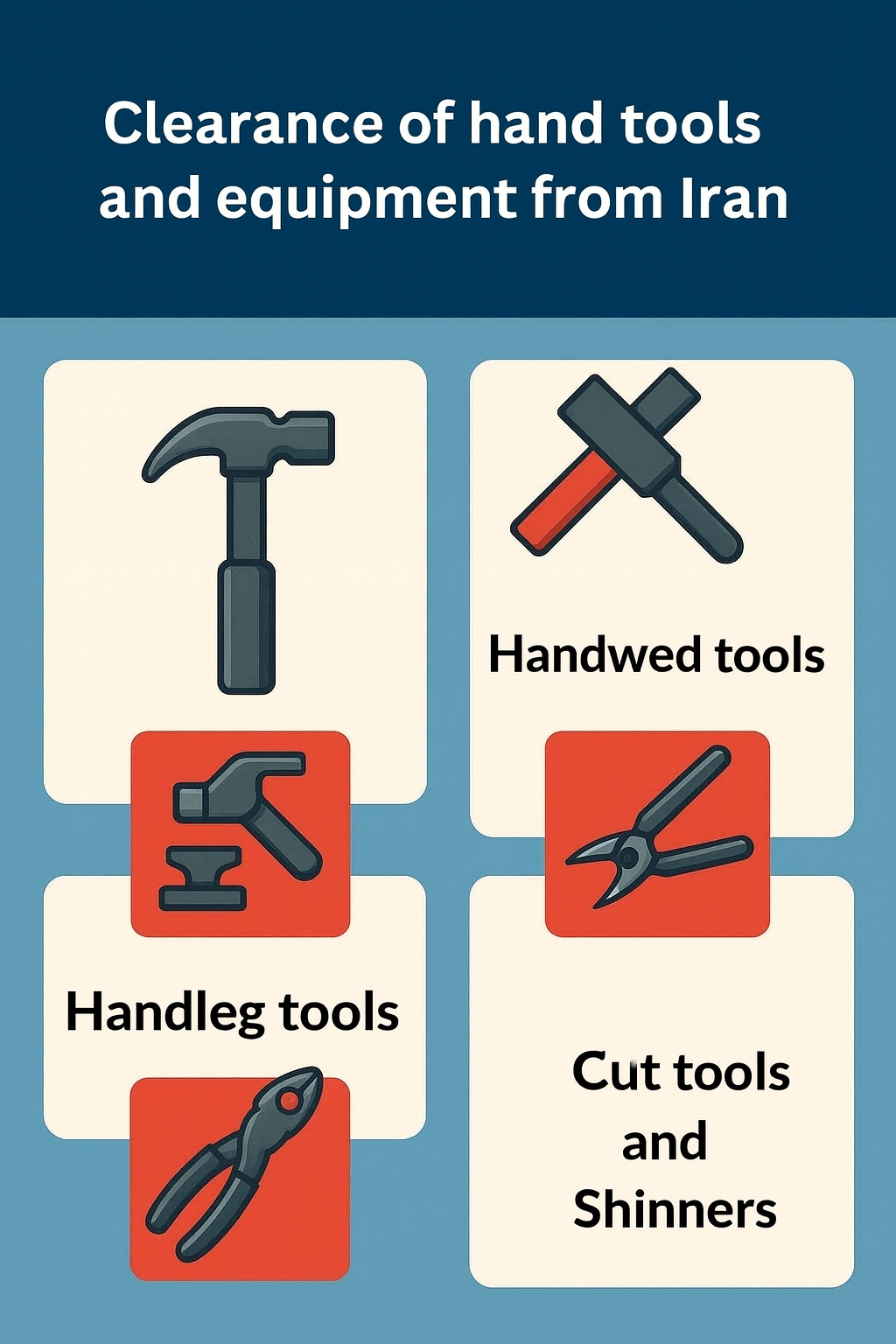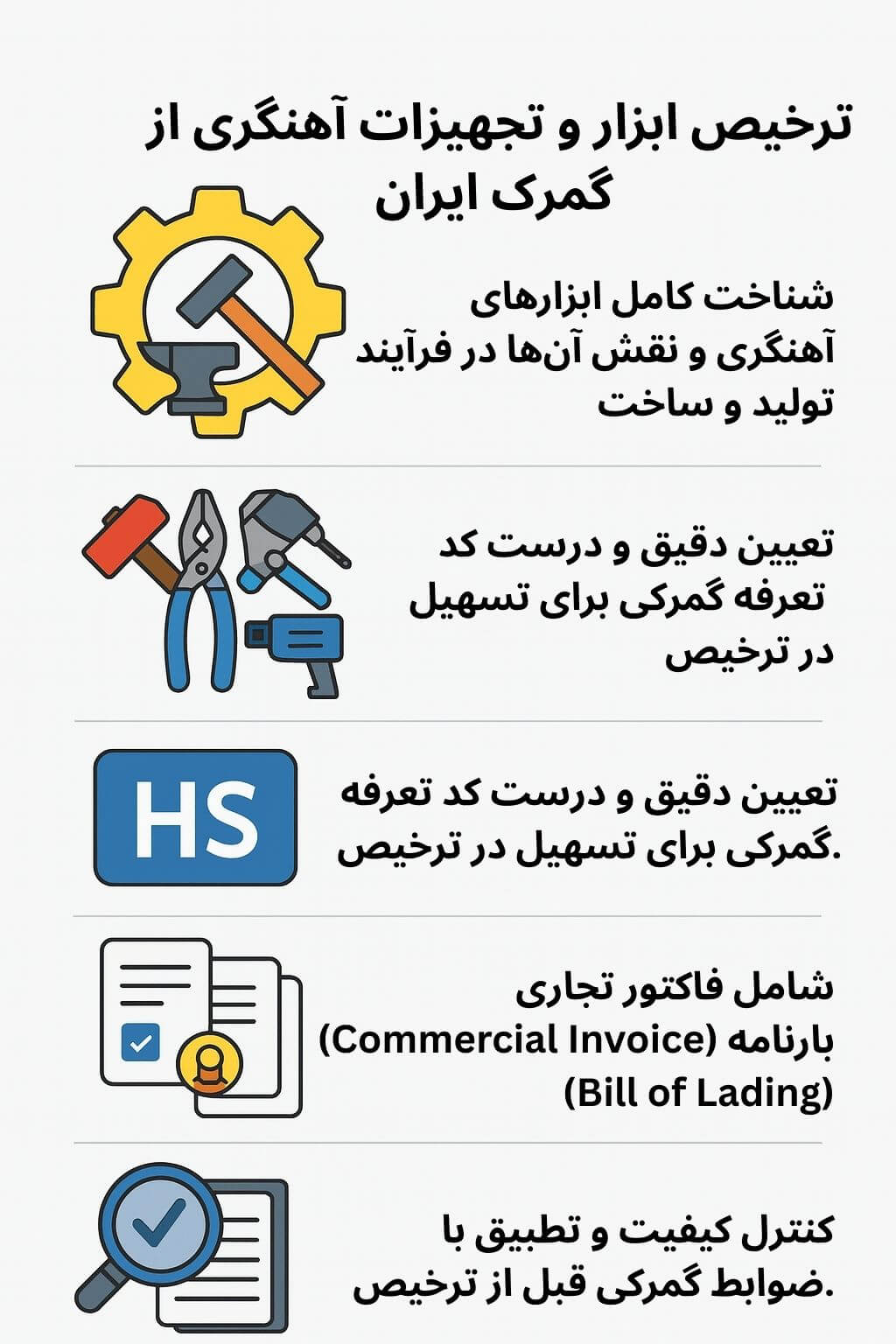Customs Clearance of Forging Tools & Equipment in Iran (HS Code + Documents & Permits)
For an estimate of the time and cost of clearing forging tools and equipment and to get the optimal documentation pathway, contact the Saba Tarkhis experts.
Instant free consultation
۱) Detailed description of forging tools and equipment
۲) Main types and applications
Industrial hammers and sledges
Essential tools for striking and shaping metals, particularly in forging. Produced in various designs such as cross-peen hammers and double-faced sledges.
Tongs and clamps
Used to hold and move metal parts during forging and welding. Types like crimping tongs and vise-grip clamps are each designed for specific uses.
Industrial shears and cutters
For cutting metal sheets of various thicknesses, including guillotine shears and plasma cutters for fast, precise cutting.
Drills and industrial drilling machines
Mechanical and electric equipment for making precise holes in metal parts; e.g., column drills and CNC drilling machines.
Welding equipment (arc, gas, laser)
Used for permanent joining of metal parts—from thin-sheet welding to heavy-duty projects—leveraging advanced technologies for quality control of joints.
Bending machines and presses
For precise bending and forming of parts; from CNC bending to heavy hydraulic presses to manufacture complex parts with high accuracy.
۳) Key points in customs clearance
Correct HS Code selection
HS Code—i.e., the WCO Harmonized System—underpins tariff setting, legal requirements, and customs control channels. Accurate code selection for forging tools is critical because:
• Customs duty rates are calculated accordingly; misclassification can lead to over/underpayment and legal consequences.
• Permits and standards may be mandated based on certain codes.
• Clearance speed depends on matching the code with the true nature of the goods.
Example: ۸۲۰۵.۲۰.۰۰ for industrial hammers; final determination for each item must be based on technical specs, use, and accompanying documents.
Preparation and submission of required documents
- Commercial Invoice: A document indicating the value of goods and terms of the transaction. It must precisely match the shipped consignment so customs can calculate customs value.
Bill of Lading: A document outlining shipment details. It should include accurate information on mode of transport, destination, and number of packages.
Certificate of Origin: A document stating the country of manufacture. It is used for preferential tariffs and rules of origin.
Quality or standards certificates: Some forging tools and equipment require specific quality certificates or compliance with national/international standards, showing the goods meet legal and technical requirements of the importing country.
Review standards and import requirements
- Many forging tools and equipment must comply with specific national or international standards. These may include:
Safety certificates: Some equipment directly used in industrial operations requires safety certificates confirming they are manufactured according to required safety standards.
Sanitary certificates: For equipment used in specialized processes such as food or pharmaceutical industries, relevant sanitary approvals are required.
Environmental compliance: In some cases, imports must comply with environmental requirements of the importing country, especially if the equipment contains particular chemicals or environmental pollutants.
Payment of import duties and taxes
- Import duties and taxes are unavoidable costs in the clearance process. For forging tools and equipment, these may include:
Customs duty: Based on the item’s HS code, customs determines how much duty must be paid. This may be calculated on the value of the goods, or on volume/weight.
Value Added Tax (VAT): Most countries apply VAT to imported goods, typically a percentage of the value plus customs duty.
Specific import charges: Some equipment may be subject to special charges in addition to duty and taxes. These can include costs related to permits, standards, or customs services.
Strict adherence to these key points can facilitate the clearance of forging tools and equipment and prevent legal and financial issues. To ensure full compliance and proper execution, partnering with an experienced customs broker such as Saba can significantly support businesses importing and clearing these items.
Rely on our team’s expertise to match the exact HS Code and documents for each item; misclassification means cost and delays.
Request a pro forma invoice۴) Customs tariff and sample HS Codes
| Item/Group | Short description | Sample HS Code |
|---|---|---|
| Industrial hammers | Hand impact tools for forging | ۸۲۰۵.۲۰.۰۰ |
| Tongs and clamps | Holding/fixturing metal parts | (case-by-case) |
| Industrial shears/guillotines | Metal sheet cutting | (case-by-case) |
| Drills/industrial drilling | Making precise holes in metal | (case-by-case) |
| Welding equipment | Arc/Gas/Laser | (case-by-case) |
| Presses and CNC bending | Precision forming and bending | (case-by-case) |
Exact classification depends on technical specs, power/capacity, application, electrical/non-electrical nature, brand, and documents.
۵) Special conditions for import and export
Imports of these items to Iran mainly come from countries such as China, Germany, Italy, and Turkey. Thanks to their industrial capabilities and advanced technology, these countries are among the world’s primary producers of forging tools and equipment.
On the other hand, the export of Iranian-made forging tools and equipment to neighboring states and Central Asia is on the rise due to good quality and competitive pricing. Iraq, Afghanistan, and several CIS countries are among the main export destinations.
۶) Iranian market
- Ongoing dependence of metalworking, construction, and infrastructure projects on steady supply of forging tools and machinery
- Customs sensitivity to matching HS with technical specifications and actual use
- Growth opportunities for domestic manufacturers and regional exports
۷) Import and export volumes
Iran’s annual imports of forging tools and equipment amount to several thousand tons, driven by strong domestic demand and the expansion of industrial and construction projects.
۸) Global market
Globally, China is the largest exporter, followed by Germany, Italy, and Japan. Major consumers are concentrated in North America, Europe, and Asia.

۹) Required documents for clearance
- Commercial Invoice (matching the consignment)
- Bill of Lading / AWB (details of transport mode, destination, number of packages)
- Certificate of Origin (for preferential tariffs/rules of origin)
- Quality/Compliance certificates with national/international standards (as applicable)
- Any specialized permits depending on HS Code and application
Key tips and practical advice
- For each item, attach the specification sheet (Spec) and product photos to speed up classification.
- For electric/non-electric machinery and capacity/power, provide clear documentation so the correct HS is selected.
- Ensure the transaction value aligns with market practice to prevent supplementary valuation.
Frequently asked questions
How do we select the correct HS Code for forging tools?
Based on technical specifications, application, and accompanying documents. Example: industrial hammers are typically under ۸۲۰۵.۲۰.۰۰; other items are determined case-by-case.
What documents are required for clearance?
Invoice, B/L or AWB, CO, quality/standards certificates, and any permits depending on HS.
What are the main import sources for these items?
China, Germany, Italy, and Turkey; Iran’s export destinations include Iraq, Afghanistan, and some CIS countries.
What are the main clearance costs?
Customs duty, VAT, and where applicable, special import charges and permit/standards costs.
۱۰) Fastest clearance method + Saba Tarkhis special services
- Pre-inspection of goods and exact HS Code determination for each item
- Completion and reconciliation of documents (Invoice, B/L, CO, certificates)
- Order registration and obtaining necessary permits (depending on HS and application)
- Calculation and payment of import duties and VAT
- Submission to customs, inspection, document control, and release
Saba Brokerage special services
With extensive experience and expertise in clearing industrial goods—especially forging tools and equipment—Saba Brokerage offers special services to its clients, including:
Specialized consulting for selecting the right HS code: Our expert team, with a precise understanding of customs tariffs, guides you to choose the correct HS code and avoid legal issues.
Complete handling of customs procedures: From order registration to goods release, every stage is handled accurately and swiftly so you can avoid the complexities of customs processes.
Transport and warehousing services: Provision of international transport and warehousing for imports at optimal cost and conditions is another service offered.
Expedited clearance: By leveraging electronic systems and direct coordination with customs, we ensure the clearance process is completed in the shortest possible time and at minimal cost.
Continuous support and detailed reporting: Our support team is available 24/7 to answer your questions and provide detailed progress reports on your shipments.
By choosing Saba Brokerage, you can rely on the team’s expertise and be confident your goods will be delivered on time and without issues.
.png)
